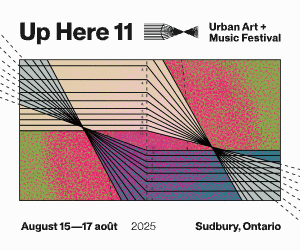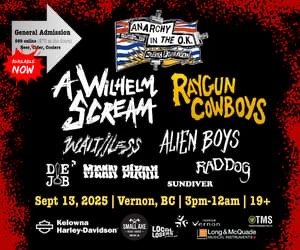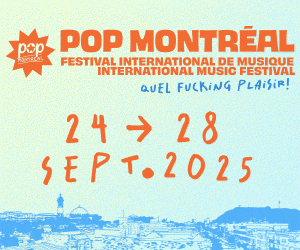My Neighbour Felix Cartal
The Juno Award winner unleashes an explosive new pop album three years in the making.
By Sean Orr
- Published on
That’s not to say he doesn’t have an air of stardom about him. Deitcher oozes a certain quiet confidence. A lot of this stems from his early career as a punk musician and his desire to simply put on a good show. That kind of self-taught DIY perspective isn’t unlike fellow Vancouver artist Andy Dixon, of whom he is close. But it’s also borne of the time when Felix Cartal was just getting started in the early 2000s. Although he played his first few shows in Glasgow where he was attending University, there was a spectre of “No Fun City” happening back at home that hung over Vancouver like a dark cloud. DJ nights that were popular at the time, like the weekly dance party Half-Alive, were beginning to push back with a different mindset: just make people have fun.
As genre purists and gearheads were losing their stifling grip on dance music with technology making things more accessible, Deitcher saw an opportunity and grabbed it. Recounting early opposition from other DJs scoffing at his simple Ableton setup, he defiantly would say after his set, “But I fucking killed it, right?” That same spirit permeates his entire career, from his early releases on Dim Mak Records that lit up the once quintessential music blog Hype Machine, to successful collaborations with Selena Gomez, Danny Brown, and Kaskade, to mainstream success and the aforementioned 2020 Juno Award that he won Dance Recording of the Year for his collaboration with Lights, “Love Me.”
His ability to think outside the box and innovate is evident from his early collabs with the likes of Johnny Whitney from the Blood Brothers, to his mastery of the vocal chop. Citing references as varied as Justice and Paul McCartney, the Felix Cartal ouvre is one that is constantly searching for a way to deliver a hook while simultaneously making you feel. Of course, this all culminates in his latest release, Expensive Sounds For Nice People, on Physical Presents.
An epic three years in the making, the album has the feel of a pinnacle career achievement. It’s written almost like a rock record, with lofty ballads and absolute bangers. It’s got that tension between uplifting and moody that is the hallmark of a musician in their prime. “Happy Hour (with Kiiara),” despite its carefree message, still has a melodramatic tinge to it. “Harmony” captures an air of nostalgic longing, like staring out the window on a legendary road trip, while “Mine (with Sophie Simmons)” has a cold country twang complemented by soaring and sentimental vocals.


But the standout is his single, “Only One (with Karen Harding).” It’s got everything a good electronic pop song needs: signature chopped vocals, slick production, soulful piano, and an absolute tour de force from guest vocalist Harding. Written and recorded in LA pre-pandemic, “Only One” has the carefree vibe that captures the zeitgeist of Summer 2019 but the timelessness to take us into a hopeful COVID-free future. It’s an antidote to a cooped up winter and a promise of better times ahead. Although he admittedly has a hard time writing “happy music”, the radio hit is both effortless and airy. That’s in keeping with who I know Deitcher to be. Smart and sophisticated yet incredibly easy to talk to. In fact, when I sat down to talk with him on a local patio for this article I forgot to ask him any questions about the album. We reminisced about the Vancouver music scene and lost venues like Mesa Luna and Seylynn Hall, not being able to understand anyone in East Glasgow because of their accents, how we both missed touring, vodka soda (he’s a part owner of the brand Wize Spirits), growing up in the suburbs, and the current state of our Gastown neighbourhood. We also talked about his side project, Glass Petals, which allows him to revisit those old grimy club tracks.
I followed up with Deitcher in his apartment, replete with platinum records on his walls that his mom convinced him to hang, as well as a Mars Volta poster that caught my eye. With such diverse musical tastes I wondered if there was a single moment that propelled him on his path. “I feel like everyone has a few moments in their life when you hear something and they are just like, ‘what is this?’ I can’t remember if it was Justice or Sebastian but it was definitely something on Ed Banger, and it just shook me.”
As impressive as Felix Cartal’s career arc has been, there’s also a sense that he’s just getting started. His boundless creativity and ever evolving style, combined with a savvy and sometimes sarcastic social media presence, will only propel him further into the mainstream. His ability to write songs for the singer and not just cut-and-paste vocals into an already written song will likely see a whole new host of potential collaborations. Whatever he does, I just hope he doesn’t figure out who keeps taking his FreshPrep meals.
Expensive Sounds For Nice People is available now via Physical Presents.
By Leslie Ken Chu
The rock stalwarts lean into vulnerability and nuance, proving that evolution doesn’t have to mean softening the blow.
By Cam Delisle
The pop veteran beamed into Rogers Arena Tuesday night with a glitchy arsenal of remixed hits—some faring better than others in her AI-styled end-of-the-world fantasia.













